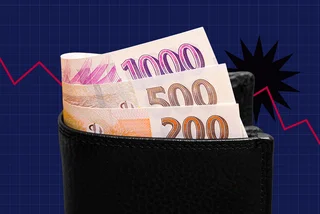A full-time employee in Czechia needed to earn at least CZK 45,865 gross per month last year to achieve what experts define as a "minimum decent wage"—the amount required to meet basic living needs, support a child, enjoy some leisure time, and build modest savings. In Prague, this value now far exceeded CZK 50,000.
However, more than 60 percent of working Czechs earned less than this threshold, according to data presented by the advocacy-oriented Platform for a Minimum Decent Wage organization.
What is a minimum decent wage?
The concept of a minimum decent wage, in contrast to the statutory minimum wage, reflects what experts consider necessary for a dignified, or comfortable, life. It includes costs for food, housing, transportation, clothing, healthcare, education, communication, leisure, and savings.
"A minimum decent wage should allow for an ordinary, albeit materially-decent life so that a person can feel like a full member of society," the organization summarizes in English.
Just how expensive has life become?
For those living in cities with higher living expenses like Prague and Brno, the threshold for a minimum decent wage has gone up significantly—to CZK 53,953, an increase of more than CZK 6,200 year on year.
In Prague and Brno, 59 percent of employees earned less than the required amount last year. Only 35 percent of workers under 35 met the minimum income level in these cities, highlighting the growing pressure on younger generations in urban areas.
“The share of workers earning below this level is stable but high,” said economist Jan Bittner at a press briefing. “Due to stagnant public sector salaries, many state employees have fallen below the threshold, even as private sector wages saw moderate growth.”
The minimum wage in the Czech Republic last year was CZK 18,900, while the average wage stood at CZK 46,165, according to the Czech Statistical Office. Despite this, the platform estimates that 2.5 million workers still earned below the minimum decent wage. That includes 56 percent of men and 72 percent of women, and only about one-third of workers under 35 earned enough to meet the standard.
Minimums needed for each aspect of life
Housing remains the largest cost driver. On average, experts calculated CZK 14,373 per month was needed for adequate housing, including utilities and services. In Prague, this figure climbed to CZK 20,076.
Other key monthly expenses on a national level included CZK 8,199 for food, CZK 1,846 for transportation, CZK 1,496 for clothing and footwear, CZK 1,412 for health and hygiene, and CZK 1,323 for telecommunications. Leisure costs were pegged at CZK 3,996, and savings at CZK 4,856.
The current economic landscape continues to weigh on household budgets. “The real purchasing power of Czech employees has still not returned to pre-pandemic levels,” Bittner noted, citing housing costs as a major factor.












 Reading time: 2 minutes
Reading time: 2 minutes 





















